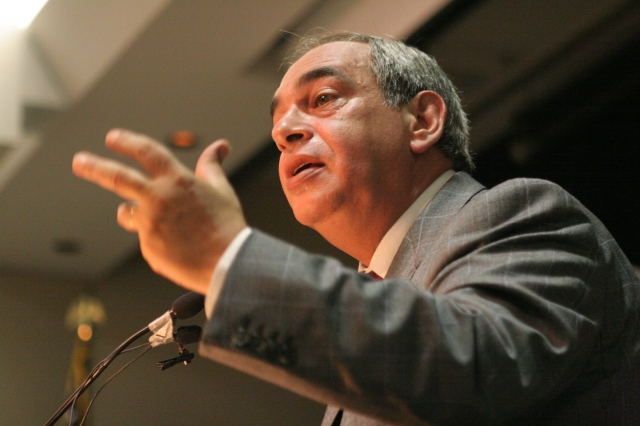Afif Safieh, a veteran Palestinian diplomat, came through Canada on a four-city tour this month to address the vexing issue of a stalled peace process in Israel-Palestine.
Based in London, Safieh is the author of The Peace Process: From Breakthrough to Breakdown, and the Palestinian Authority’s roving ambassador for special missions. Currently, he is visiting this country on behalf of the Canadian Friends of Sabeel. Sabeel — the Arabic word for the “the way” — is a Jerusalem based Palestinian Christian ecumenical centre that promotes peace and justice in the Middle East.
A Palestinian Christian himself and speaking both “personally and officially” the voluble diplomat maintains in a recent interview in Toronto that the two-state solution remains “do-able,” despite the continued expansion of illegal Jewish settlements in the occupied territories of the West Bank and east Jerusalem — approaching more than a half a million at this point.
“The territories that were occupied in 1967, they could also be evacuated in six days so that you can rest on the seventh; and we can then engage in a fascinating journey of nation building and economic development.”
Safieh says the PA’s position is well known and represents the consensus position of the Arab League since 2002. That is, a negotiated establishment of a separate Palestinian state on territory seized by Israel during the June 1967 war. There would be some territorial land swaps containing Jewish settlement blocs with Israel in exchange for an equal amount of land from the Israeli side.
But the majority of settlements must be evacuated despite their size and scope, Safieh asserts.
With all of the attention paid to the results in the recent Israeli election and the ongoing coalition building, Safieh argues that a final settlement on the Israel-Palestine situation cannot remain “hostage” to Israel domestic politics.
In the last two decades of what he describes as a “flawed” peace process, “too much was left to the local belligerent parties [Israel and the Palestinians],” he maintains.
And Safieh indirectly quotes the now deceased Israel diplomat Abba Eban, who in his last days admonished his own country for not taking full advantage of a strong desire for a peaceful resolution by the Palestinians. (The Palestinian diplomat says that Eban did not, as has been claimed, always blame the other side for the failure of the peace process.)
“Today the diplomatic impasse is not due to an Arab rejection of Israel but it is due to an Israeli rejection of Arab acceptance [of Israel’s existence] paradoxically,” says Safieh.
Safieh notes that peace in Israel has always strangely meant “a compromise,” among the major political parties on how to “dictate” terms to the Palestinians — in a weaker position, militarily, economically and politically.
In reality, he has written, it was the Labour governments in Israel after the 1967 war that first embarked upon the Jewish settlement building process on Palestinian land and this has continued more openly and aggressively under the Likud led coalitions of Menachem Begin, Ariel Sharon and Benjamin Netanyahu.
“The entire exercise of successive Israeli governments is how to acquire as much of Palestinian geography as possible [at the expense] of [as much] Palestinian demography as possible.”
One result has been the departure of thousands of Palestinian Christians — representing an important segment of the educated Arab middle class in the occupied territories — from the Jerusalem and Bethlehem areas with the encroachment of Jewish settlements, such as Har Homa and Gilo.
Once encompassing about eight per cent of the largely Muslim Palestinian population in the West Bank and east Jerusalem, the Christian population has dwindled to about 1.5 per cent, Safieh explains. “Some of the settlements have hit the Christian areas very hard.” And, the Palestinian diplomat continues, “twenty years of theoretical peace making, has not resulted in Israeli withdrawal as a result of occupation; it has resulted in the expansion of the occupation.”
Because Israel remains in a strong position to maintain the status quo — expansion of settlements and no peace — Safieh says the onus is on the international community, particularly the United States and secondly possibly the European Union to pressure the Tel Aviv government into a peace deal.
Getting in the way is what Safieh describes as “the self-inflicted impotence of the major external actors and here I am thinking mainly of the U.S.”
“Unfortunately, when America promises some pressure on the Israelis it looks like the world’s only super power has the weight of Luxembourg or Lichtenstein,” he observes.
Safieh blames the clout of pro-Israel lobbyists as represented by America Israel Public Affairs Committee (AIPAC) in Washington which he says has discouraged successive U.S. administrations from playing a significant role in the peace making process. “America is often paralyzed by the pro-Israeli lobby that has hijacked policy making.”
The big question for the Palestinian diplomat is whether U.S. President Barack Obama in his second mandate feels freer than he was in the first mandate to play a more direct role in the Middle East.
So far, says Safieh, the signs do not look good. He notes that the former U.S. Republican Senator Chuck Hagel had to soften his initial criticism of the “intimidating” role of AIPAC in American politics in order to win the nomination to the position of secretary of defense by the U.S. Senate.
“In the last weeks, there has been arm twisting. Had [Hagel] stuck to his own analysis, [his nomination] might have been torpedoed and destabilized. We have been seen the power of the lobby, again deployed in the most undignified manner.”
Safieh has been described as “the most experienced and skilled Palestinian diplomat having served in three politically significant capitals: London, Washington, and Moscow.” During his service, he was involved in the Stockholm negotiations that led to the first official and direct American-Palestinian dialogue.
Paul Weinberg is a Toronto-based freelance writer.
Photo: Indybay.org



